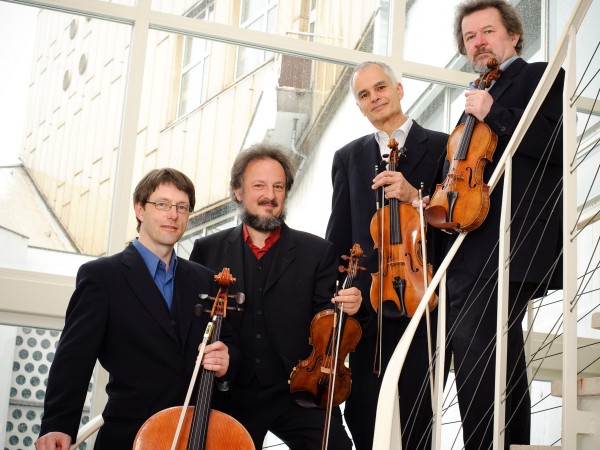Philharmonia Quartett Berlin brings refined tone and expressive depth
Musicians from the Berlin Philharmonic have come to Boston in a grand fashion on several occasions this season. This past November saw the return of the famed orchestra in Simon Rattle’s final Boston appearance as conductor. And last month the Berlin Philharmonic Wind Quintet presented an intriguing program of works by Aho, Ligeti, and Nielsen.
Friday night at Jordan Hall, the Celebrity Series presented the Philharmonia Quartett Berlin, yet another fabulous ensemble to be drawn from the orchestra’s ranks.
Founded in 1985, the quartet has risen to become one of the finest chamber ensembles on the scene today. Violinists Daniel Stabrawa and Christian Stadelmann along with violist Neithard Resa are the quartet’s original members. Cellist Dietmar Schwalke joined the ensemble in 2009 after the death of Jan Diesselhorst. Together, their sound is refined and capable of nuanced shades of expression. Violin phrases are bright without overshadowing the other players. Schwalke’s cello brings a singing yet sturdy bass voice to the group.
Their program, which featured works by Haydn, Beethoven, and Schumann, offered a glimpse at the evolution of the string quartet genre. That development owes much to tradition. Schumann composed his three string quartets after studying the works of Haydn and Beethoven. His String Quartet Op. 41, No. 1 in A minor, heard Friday night, manages to capture Beethoven’s intensity.
Yet Schumann’s lyricism is ever present. The Introduction, with its interlocking lines, also owes much to Bach’s influence. Here, the Philharmonia Quartett’s tone was smooth and rosy. The musicians found the surging intensity in the lines of the central section, which crested and broke like a wave.
Beethoven’s influence can be heard in the work’s fast movements, which sounded with just the right amount of edge to the tone. The Scherzo’s march-like snaps moved with hushed agitation. The Finale brimmed with sudden and jarring transitions, all handled with an understated sense of the musical drama. The third movement, with its singing arcs of melody, was beautiful. Schwalke’s cello managed to soar in the phrases that took the player all over the fingerboard.
In the opener, Haydn’s String Quartet Op. 64, No. 4 in G major, the ensemble played with a completely different character. Sonorities were bright. The Menuetto managed to whirl with energy while staying tethered to the ground. Marking this performance, too, was Haydn’s wit, which revealed itself in the quirky first movement.
This work, moreover, resembles the violin-heavy style that marks the composer’s early quartets. First violinist Stabrawa was in fine form throughout, playing with searching lyricism and tasteful dynamic shading when called upon. The Finale had driving momentum and intensity.
The Philharmonia Quartett’s performance of Beethoven’s String Quartet, Op. 18, No. 6 proved revelatory. The ensemble’s tempos were nimble, and the repetition of the first movement’s exposition took on a bristly quality, which gave the music stirring energy. The sudden pauses and abrupt harmonic shifts in the development section, all handled with the same understated drama that marked the Schumann, revealed a composer who was experimenting with form even at this early stage in his career.
The Adagio was a true conversation among friends. Here, waving figures were traded sensitively between each instrument. The Scherzo spun robustly in its off-center groove, and in the Trio the musicians shaped their phrases with gentle ebb and flow to the tempo.
“La Malinconia,” the slow opening to the Finale, is the gem of the Op. 18 quartets. The Philharmonia Quartett rendered it with searching musicality and a warm tone that seemed to glow at a distance. The ensuing Allegretto moved as a dance, the music swirling in the generous rubato tempo.
The encore, the Allegro assai from Beethoven’s String Quartet, Op. 130, displayed for a final moment the characteristics that marked the Philharmonia Quartett’s playing all evening: smoothness of tone and cool sophistication.
The Celebrity Series will present yMusic in the first of the organization’s Stave Sessions 8:30 p.m. March 21 at 160 Massachusetts Ave. Boston. celebrityseries.org; 617- 482-6661
Posted in Performances





